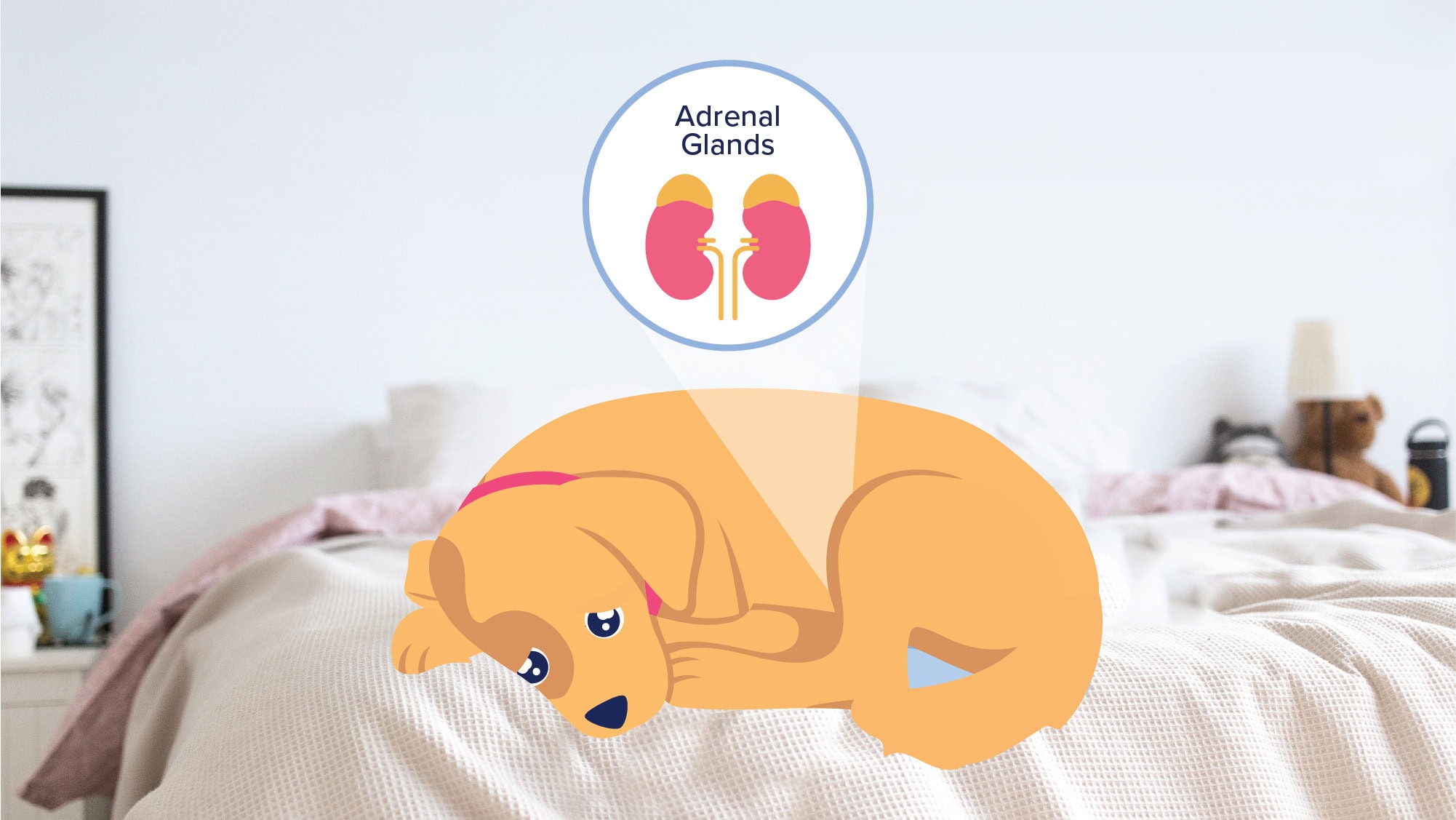In this blog, we’ll shed light on Addison’s Disease in dogs. This hormonal disorder, also known as hypoadrenocorticism, can have significant effects on your dog’s health. We’ll explore the causes, symptoms, and available treatments for this condition.
Understanding Addison’s Disease is crucial for early detection and proper management. So, let’s delve into the world of Addison’s Disease in dogs and equip ourselves with valuable knowledge to ensure the well-being of our canine friends.
What is Addison’s Disease in Dogs?
Addison’s disease, also known as hypoadrenocorticism, is a hormonal disorder in dogs where the body underproduces certain vital steroid hormones. It primarily involves the underproduction of glucocorticoid hormones (including cortisol) and mineralocorticoid hormones (such as aldosterone), essential for various bodily functions.
What Causes Addison’s Disease in Dogs?
Addison’s disease in dogs is mainly caused by the immune system mistakenly attacking and damaging the adrenal glands responsible for producing essential hormones. This can happen due to immune system-related issues.
Other less common causes include tumors, infections, or injuries to the adrenal glands. In rare cases, using certain medications for another condition can also lead to Addison’s disease.
Another type of Addison’s disease, called “secondary hypoadrenocorticism,” occurs due to problems outside the adrenal gland. One possible cause is related to issues in the pituitary gland, a gland in the brain that helps regulate hormones. Problems like pituitary gland tumors can disrupt hormone regulation.
Secondary hypoadrenocorticism can also happen if a dog stops taking steroid medications for other health conditions. Following the veterinarian’s guidance on gradually reducing steroid medication is essential to avoid potentially life-threatening situations.
Signs & Symptoms of Addison’s Disease in Dogs
The signs of Addison’s disease in dogs can be vague and nonspecific. Common symptoms include:
- Vomiting
- Diarrhea
- Appetite loss
- Weight loss
- Increased drinking and urination
- Shaking episodes
- Weakness
- Lethargy/depression
In severe cases, dogs may experience an “Addisonian crisis,” characterized by extreme weakness, collapse, severe vomiting, dehydration, and potentially life-threatening electrolyte imbalances.
Dog Breeds Most at Risk from Addison’s Disease
While Addison’s disease can affect any dog breed, certain breeds are more susceptible. These breeds include Standard Poodles, Nova Scotia Duck Tolling Retrievers, Portuguese Water Dogs, Bearded Collies, Great Danes, and West Highland White Terriers. The disease commonly presents in young to middle-aged dogs.
How is Addison’s Disease Diagnosed in Dogs?
Diagnosing Addison’s disease in dogs involves several steps. The veterinarian will consider the pet’s medical history and perform thorough urine and blood tests to check organ function and electrolyte levels. However, it can be challenging because some dogs with Addison’s may have normal test results. A definitive test called the ACTH stimulation test is conducted to confirm the diagnosis. This involves a two-stage blood test. In some cases, additional tests like X-rays, ultrasounds, or MRI scans may be needed to investigate the underlying cause in more detail.
Treatment for Addison’s Disease in Dogs
The treatment for Addison’s disease in dogs aims to replace the deficient hormones. The primary treatment option is an injectable medication called desoxycorticosterone pivalate (trade names Zycortal® or Percoten®-V), which is given every few weeks. This medication replaces the mineralocorticoid hormone. Some dogs may also require a glucocorticoid hormone supplement. Long-term management involves adjusting the medication dosage based on regularly monitoring electrolyte levels.
Additionally, lifestyle management is essential, with efforts to minimize stress and avoid stressful situations for the dog.
Conclusion
Addison’s disease in dogs can be tricky to diagnose due to its often vague presentation and waxing and waning nature. However, once a diagnosis has been obtained, your dog can be expected to live a happy, relatively everyday life with lifelong medication. If you are worried your dog has Addison’s, schedule a check-up with your veterinarian.
Talk to a veterinarian online with BetterVet if you have any other pet-related questions or concerns!
Frequently Asked Questions
Is Addison’s disease fatal in dogs?
If left untreated, Addison’s disease can be fatal in dogs.
How long can a dog live with Addison’s disease?
With proper treatment and care, dogs with Addison’s disease can have a good prognosis and live fulfilling lives. The long-term outcome varies depending on the dog’s overall health and response to treatment.
Is Addison’s disease in dogs hereditary?
Addison’s disease in dogs is believed to have a genetic component, but it is not solely determined by heredity. Other factors, such as immune system dysfunction or certain infections, can also contribute to the development of the disease.
How common is Addison’s disease in dogs?
Addison’s disease is relatively rare in dogs. However, certain breeds, such as Standard Poodles, Portuguese Water Dogs, and West Highland White Terriers, are more predisposed to the condition.
How to get a dog with Addison’s disease to eat?
To encourage eating in a dog with Addison’s disease, offer a balanced and nutritious diet, smaller and more frequent meals, warm the food, and consult with your veterinarian for appetite stimulants.





